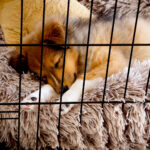Dog owners frequently misunderstand or mishandle dog behaviour issues. Perhaps you are new to dog ownership, considering getting a dog, or simply want to assist your dog with a difficult condition. Understanding the most frequent dog behaviour issues is the first step toward resolving and preventing them. Many of these issues can be avoided or controlled with a firm foundation of obedience training.
1. Excessive Barking
The majority of dogs vocalise in some fashion. They may bark, howl, whine, and other sounds. Excessive barking is regarded as a behavioural issue.
Determine why your dog is vocalising in the first place before you can correct excessive barking. The following are the most prevalent types of barking:
- Warning or alert
- Playfulness and excitement
- Attention-seeking
- Anxiety
- Boredom
- Responding to other dogs
Learn to control your dog’s excessive barking. Consider teaching them the instructions bark and quiet. Maintain consistency and patience. Identify and address any underlying causes of barking. Dedication and attention to detail can go a long way toward reducing barking in a dog.
2. Chewing
Chewing is a natural behaviour in all dogs. Chewing is, in reality, an important habit for most dogs; it’s just how they’re wired. Excessive chewing, on the other hand, can rapidly become a behaviour issue if your dog causes destruction. The most common reasons for dog chewing are:
- Puppy teething
- Boredom or excess energy
- Anxiety
- Curiosity (especially puppies)
Provide plenty of acceptable chew toys to encourage your dog to gnaw on the proper things. Keep personal belongings away from your dog. When you are not at home, keep your dog crated or confined to a less destructive place.
If you catch your dog gnawing on the wrong thing, make a loud noise to distract him. The object should then be replaced with a chew toy. One of the most important things you can do is ensure that your dog gets enough exercise so that it may burn off energy and be stimulated in other ways rather than chewing.
3. Digging
Most dogs will dig if they are given the opportunity; it is instinctual. Certain dog breeds, like terriers, are more prone to digging because of their hunting histories. Most dogs dig for the following reasons:
- Boredom or excess energy
- Anxiety or fear
- Hunting instinct
- Comfort-seeking (such as nesting or cooling off)
- Desire to hide possessions (like bones or toys)
- To escape or gain access to an area
If your dog digs up your yard, it can be very frustrating. Determine the source of the digging and then work to eliminate it. Increase your dog’s activity, spend more quality time with him, and concentrate on extra training. If digging seems unavoidable, designate a place for your dog to dig freely, such as a sandbox. Teach your dog that digging is only permitted in this area.
4. Separation Anxiety
One of the most frequently addressed canine behaviour issues is separation anxiety. When a dog is separated from its owner, it may exhibit vocalisation, gnawing, inappropriate urine and defecation, and other forms of destruction. 2 Not all of these behaviours are caused by separation anxiety. The following are symptoms of true separation anxiety:
- The dog becomes anxious when the owner prepares to leave.
- Misbehaviour occurs in the first 15 to 45 minutes after the owner leaves.
- The dog wants to follow the owner around constantly.
- The dog tries to be touching the owner whenever possible.
True separation anxiety necessitates intensive instruction, behaviour change, and desensitisation techniques. In severe circumstances, medication may be prescribed.
5. Biting
Dogs bite and nip for a variety of reasons, most of which are instinctive. Puppies pinch and bite to investigate their surroundings. Mother dogs teach their puppies to bite softly and reprimand them when necessary. This assists the puppies in developing biting inhibition. Owners must frequently demonstrate to their puppies that mouthing and biting are unacceptable by continuing to teach bite inhibition.
Dogs may bite for a variety of reasons aside from puppy behaviour. Biting or snapping is not always motivated by aggressiveness. For a variety of causes, a dog may snap, nip, or bite.
- Fear
- Defensiveness
- Protection of property
- Pain or sickness
- Predatory instinct
Any dog may bite if the dog believes the circumstances merit it. Through correct training, socialisation, and breeding procedures, owners and breeders can help reduce the likelihood of any type of dog biting.
The reasons for aggression are similar to the reasons a dog bites or snaps, however, canine aggression can develop from a simple quirk to a much more serious problem. Consult your veterinarian first if your dog is aggressive, as it may be due to a health issue. Then, seek the assistance of a seasoned dog trainer or behaviourist.
Looking for a way to keep your dog happy and healthy? Don’t forget to grab your dig-in today – BUY NOW!
Further Reading:
https://www.royalcanin.com/au/dogs/puppy/understanding-your-puppys-behaviour





